Lost Odyssey
Surely it's better than Blue Dragon. Right?
| Version Xbox 360 | Developer Mistwalker | Publisher Microsoft | Genre RPG |
||||
I didn't like Blue Dragon. I slated it for being boring and formulaic, pretty much, and I stand by that opinion. Frankly I expected the same from Lost Odyssey, the newest release from Mistwalker and ex-Final Fantasy bod Hironobu Sakaguchi . I wasn't wrong. But I didn't hate it either - in fact, I did that thing which is the opposite of disliking something, whatever that's called. It wasn't because of the graffixses, the mad choonz, the stilted gameplay or the generally-good-but-still-sometimes-awful voice acting: it was because of the stories the game told.
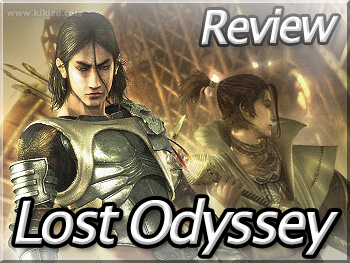
The short stories make the game what it is - without them it's merely a decent enough JRPG. Better than Blue Dragon by a huge, huge amount, but still nothing more than decent. Throw in the stories contained in the game as dreams and things are taken to a level I personally didn't expect - as a form of 'interactive literature' (as I rack my brain for a far better name than that) and backed by some memorable (though often repeated) scores from FF-stalwart Nobuo Uematsu, the experience is one I would recommend highly.
The normal broody twat main character actually has genuine reasons for being as he is - his thousand years of history, as slowly revealed to the player, show the incredible situations Kaim has experienced in his life. And my word if they aren't sad. Themes of loss are played on heavily, which comes as an inevitability thanks to Kaim's immortality, and the loss of so many people he knows and loves is covered in detail through the many dreams in the game. The same goes for the dreams of the other immortals, each following the similar path of loss, regret, the futility of such a short life, the general futility of human pursuits, love, more loss, war, racism, the beauty of simplicity, cowardice, idiocy and a great deal more loss. Whereas Squall (from FFVIII, for those unsure) was a moody berk for seemingly no reason, Kaim has seen all the bad that the world has to offer and has seen 99 percent of the people he loves die. I think that's a viable reason to be at least a little brooding.
And it just means that when Kaim encounters things that conjure an emotional reaction from him it's all the more powerful - these cut scenes rely on the player having taken in all the dreams and count on the player identifying with the situation. Ignore them and it may seem like an over-the-top outburst at a minor situation. It's depth of character sorely lacking in many other games. I'm not saying it's on a par with the highest-regarded literature, but it's a huge step in the right direction. If you don't have tears in your eyes in at least one point of this game then... Well, you're the same as me. But that's because I have the heart of a particularly callous brick.
Translations of the dreams are handled by Jay Rubin (more famed for his work on the novels of Haruki Murakami) from Kiyoshi Shigematsu's original text, and my word does it show. Sometimes, sometimes the prose does feel a little stilted - forced, even - but in the vast majority they are excellent, excellent pieces of work and surely carried off just as well as the Japanese originals. So well done there. Without such care the memories could have been nothing more than a ham-fisted attempt to draw the player into character histories. Handled in the manner they have, however, the dreams turn from simple distractions into something that makes the game transcend its decidedly old fashioned in-game mechanics.
It's a shame then that the story told in game is pretty poor by comparison, covering far more run of the mill subjects and being told in a far less subtle, evocative manner. It still isn't bad, but it is incredibly generic, covering the matter of a bad man doing some bad stuff that you have to stop, with a few novelty angles thrown in from the cast of immortals. It doesn't hurt the experience a huge amount, but when the story of the main game sits side by side with those told in the dreams it really shows the gap in quality - I accept that concessions have to be made. It is a game after all. But it doesn't hide the fact that the gulf in quality between the two sets of story is pretty vast.
The mechanics of the game itself - finally I'll talk about something not related to the stories - are standard JRPG fare. If you have played any title from the genre in the last three thousand years you will not be surprised in the slightest by anything the game throws up. Elements have been added here and there that do mix things up or add a new feature - the use of rings in battle necessitating a well-timed press and hold of the right trigger, for example - but none of these are so totally alien as to make the experience anything other than the standard to which we are all familiar with. Magic does this, swords do that, simple equipment loadouts for characters do them, a reasonably in-depth skill system done that. There is literally nothing that will surprise.
Normally this would be the kind of thing that makes blood shoot involuntarily from my eyes and anus, but Lost Odyssey has its previously mentioned Get Out of Jail Free card in the shape of story time. It's like being forced to eat a particularly bland sandwich, only to find someone's left a £20 note between the processed beef and the plain white bread, making for a far more pleasurable blandwich-eating experience. And it makes me strangely happy.
There are issues with framerate, meaning things can get that bit choppy now and then - but in a game like this it really doesn't matter a great deal. Don't get me wrong, it's still bloody annoying that a NEXT GEN WOAH! console is having trouble with a title as slow-paced and sedate as this, but it really doesn't matter in the grand scheme of things. It can also be annoying how long you have to wait before a battle loads up fully, but anyone trying to rush through any part of the game isn't playing Lost Odyssey how it's meant to be played - you can't motor through and it will take you at least 35-40 hours, so pissing and moaning about a few seconds loading is an exercise in futility.
Sound is another feather in the cap of Lost Odyssey - voice acting is generally of the good variety, with special mention to the (as every other publication in the world has pointed out) actually quite funny Jansen. It's not all great, mind, with Cooke in particular making me want to take a hammer to her stupid little face more than once. Calm down, she isn't real. The aforementioned Nobuo Uematsu musical score is solid, verging on pretty-effing-good at points and slipping back down to 'hang on isn't this just the Shin-Ra tune from FFVII?' at other points, but the music is so perfectly suited to the dream sequences that I really don't care, even if most of the tracks are repeated a thousand and one times.
I said around a month ago that I needed a random RPG that would take my time up and wouldn't be as demanding on reflexes, skill or concentration as many of the other games available on the current crop of consoles. So it was blind luck that Doree sent Lost Odyssey my way, and while initially sceptical, any fears about impending boredom or a pretty turd of a game were soon put to rest. It isn't perfect, but some parts of it are.
| ||||||||||||
|

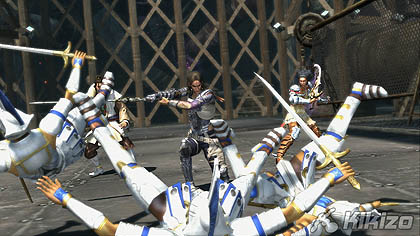






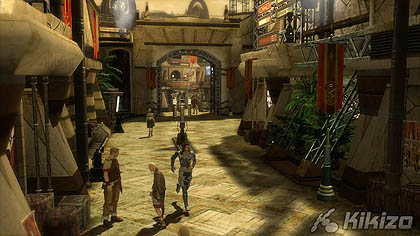




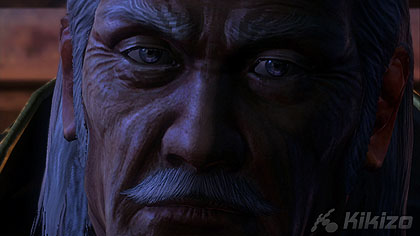
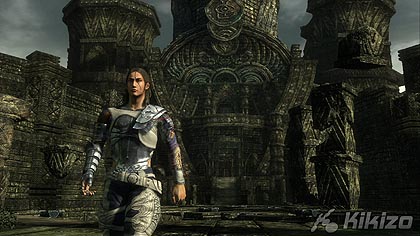




 Satoru Iwata Video Interview - the late Nintendo president spoke with Kikizo in 2004 as 'Nintendo Revolution' loomed.
Satoru Iwata Video Interview - the late Nintendo president spoke with Kikizo in 2004 as 'Nintendo Revolution' loomed. Kaz Hirai Video Interview - the first of Kikizo's interviews with the man who went on to become global head of Sony.
Kaz Hirai Video Interview - the first of Kikizo's interviews with the man who went on to become global head of Sony. Ed Fries Video Interview - one of Xbox's founders discusses an epic journey from Excel to Xbox.
Ed Fries Video Interview - one of Xbox's founders discusses an epic journey from Excel to Xbox. Yu Suzuki, the Kikizo Interview - we spend time with one of gaming's most revered creators.
Yu Suzuki, the Kikizo Interview - we spend time with one of gaming's most revered creators. Tetris - The Making of an Icon: Alexey Pajitnov and Henk Rogers reveal the fascinating story behind Tetris
Tetris - The Making of an Icon: Alexey Pajitnov and Henk Rogers reveal the fascinating story behind Tetris Rare founders, Chris and Tim Stamper - their only interview? Genuinely 'rare' sit down with founders of the legendary studio.
Rare founders, Chris and Tim Stamper - their only interview? Genuinely 'rare' sit down with founders of the legendary studio. The History of First-Person Shooters - a retrospective, from Maze War to Modern Warfare
The History of First-Person Shooters - a retrospective, from Maze War to Modern Warfare